HAPPINESS AND UNHAPPINESS IN CHINA
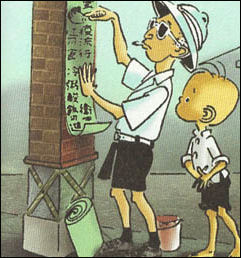
Sanmao, irreverent Chinese humor
When asked about the quality of their life on a 1 to 10 scale, 23 percent of the Chinese surveyed ranked themselves as 7 or better, compared to 60 percent in the United States and 8 percent in Tanzania. The Chinese have a saying “extreme happiness begets tragedy.”
World Happiness Report Score: 5.12 (compared to 7.5 in Denmark and 3.3 in Tanzania). China ranked 94th out of 153 countries. The ranking is based on a Cantril ladder survey in which respondents in each economic are asked to think of a ladder, with the best possible life for them being a 10, and the worst possible life being a 0. They are then asked to rate their own current lives on that 0 to 10 scale. [Source: United Nations Sustainable Development Solutions Network and Wikipedia wikipedia.org/wiki/World_Happiness_Report
Happy Planet Index: 25.7, 72nd out of 140 countries. Compiled by the British think-tank New Economics Foundation, It measures people’s well-being and their impact on the environment through data on life satisfaction, life expectancy and the amount of land required to sustain the population and absorb its energy consumption.. happyplanetindex.org/countries]
The Chinese actress Bai Ling told Time, “Chinese culture is more laid back...The West is always too busy to respect silence.” In the early 1600s, Matteo Ricci observed that the Chinese “are quite content with what they have...in this respect they are different from the peoples of Europe who are frequently discontent with their own governments and covetous of what others enjoy. While the nations of the West seem to be entirely consumed with supreme domination, they cannot even preserve what their ancestors bequeathed them, as the Chinese have done through a period of some thousands of years.”
Ellen Li wrote in The Atlantic: “While China has created an economic miracle in the past three decades, there is scant evidence that the Chinese people are, on average, any happier, according to an analysis of survey data by Richard A. Easterlin, a professor of economics at the University of Southern California. If anything, they are less satisfied than in 1990, despite a seventeen-fold increase in real per-capita GDP during that span. Decreasing satisfaction is most evident in the least wealthy third of the population. Satisfaction among Chinese in even the upper third has risen only moderately. More Chinese are feeling less happy because of growing income disparity, a deteriorating natural environment, and the proliferation of other social problems. [Source: Ellen Li, The Atlantic, December 12, 2012]
Barbara Demick wrote in the Los Angeles Times, “In general, do you feel happy? If you had a second chance in life, would you rather be an honest farmer, a hard-working laborer, a worry-free civil servant, a respected manager, a designer, an office clerk, a teacher, a homemaker, or stay in your current profession? What would make you happier? It seems almost gratuitous to be posing such questions in a country where income levels have increased fivefold in half a generation. But the Chinese are discovering one of life's greatest lessons: that money doesn't necessarily buy you happiness. And increasingly, they are asking themselves and each other not "Did you eat today?" — a traditional greeting in China — but "Are you happy?" The concept of happiness, xingfu, is somewhat alien here, there being no equivalent of Thomas Jefferson, credited with enshrining "the pursuit of happiness" at the same level as life and liberty in the Declaration of Independence. (An exception is one verse of the revolutionary ballad "The East is Red," which states that "Chairman Mao seeks happiness for his people.")” [Source: Barbara Demick, Los Angeles Times, May 16, 2011]
Websites and Sources: Book: Understanding the Chinese Personality mellenpress.com ; Understanding Chinese Business Culture legacee.com ; Status of Chinese People Blog chinaview.wordpress.com ; Chinese Human Genome Diversity Project www.pnas.org ; Opinions on Asian Fetish colorq.org ; Essay on Humor, China and Japan aboutjapan.japansociety.org ; . Book: One of the most enlightening books about China is “Chinese Lives” by Sang Ye and Zhang Xinxin, a series of interviews with ordinary Chinese talking very candidly about what matter to them.
See Separate Articles ASIAN CHARACTER AND PERSONALITY: HAPPINESS, LOSING FACE, CONFUCIANISM AND BUDDHISM factsanddetails.com ; PEOPLE OF CHINA: DIVERSITY, ASSIMILATION, HAN AND ETHNIC RELATIONS factsanddetails.com ; HAN CHINESE factsanddetails.com ; CHINESE PHYSICAL CHARACTERISTICS AND STRENGTH factsanddetails.com ; CHINESE PERSONALITY AND CHARACTER: CONFUCIANISM, COMMUNISM AND DIVERSITY factsanddetails.com ; CHINESE PERSONALITY TRAITS: INDIRECTNESS, PRAGMATISM, COMPETITION AND FACE factsanddetails.com ; SOCIALIZING AND SOCIAL CUSTOMS IN CHINA factsanddetails.com ; HUMOR IN CHINA: ITS HISTORY AND FORMS OF EXPRESSION factsanddetails.com ; STRESS, ARGUING AND BULLIES IN CHINA factsanddetails.com ; CALLOUSNESS IN CHINA, GOOD SAMARITANS AND THE HIT-AND-RUN DEATH OF A TWO-YEAR-OLD factsanddetails.com ; CHINESE CHARACTERISTICS”: A SEMI-RACIST BUT INSIGHTFUL VIEW OF CHINA FROM 1894 factsanddetails.com ; REGIONAL DIFFERENCES IN CHINA factsanddetails.com ; BEIJING VERSUS SHANGHAI factsanddetails.com ; CHINESE SOCIETY, CONFUCIANISM, CROWDS AND VILLAGES Factsanddetails.com/China ; CHINESE SOCIETY AND COMMUNISM Factsanddetails.com/China ; RELIGION, FOLK BELIEFS AND DEATH ( Main Page, Click Religion) Factsanddetails.com/China JAPANESE PERSONALITY AND CHARACTER Factsanddetails.com/Japan ; JAPANESE SOCIETY Factsanddetails.com/Japan
RECOMMENDED BOOKS: “The Chinese Mind: Understanding Traditional Chinese Beliefs and Their Influence on Contemporary Culture” (2009) by Boye Lafayette De Mente Amazon.com; “It's All Chinese To Me: An Overview of Culture & Etiquette in China” by Pierre Ostrowski Matthew B. Christensen, Gwen Penner (Illustrator) Amazon.com; “China in Ten Words” by Yu Hua, translated from the Chinese by Allan H. Barr (Pantheon) Amazon.com; “Chinese Characters: Profiles of Fast-Changing Lives in a Fast-Changing Land” by Angilee Shah, Jeffrey Wasserstrom, et al. (2012) Amazon.com; “China Men”, a National Book Award Winner by Maxine Hong Kingston Amazon.com; “Understanding the Chinese Personality: Parenting, Schooling, Values, Morality, Relations, and Personality” (1998) by William J. F. Lew Amazon.com; “Niubi!: The Real Chinese You Were Never Taught in School” by Eveline Chao and Chris Murphy Amazon.com; “The Ultimate Chinese Dictionary of Swear Words: a Chinese Phrase Book of Essential Colloquial Chinese Slang With Contextual Information and Sample Sentences by Liu San Amazon.com; “The Guide to Chinese Horoscopes: The Twelve Animal Signs” by Gerry Maguire Amazon.com; “Chinese Characteristics” (1894) by Arthur H Smith Amazon.com; “Readings in Han Chinese Thought” by Mark Csikszentmihaly Amazon.com; “The Good Earth” by Pearl Buck(1931). Amazon.com;“The Book of Chinese Names: A Guide to Auspicious and Elegant Names” by Goh Kheng Chuan and Goh Kheng Yew Amazon.com
Happy Talk in Beijing
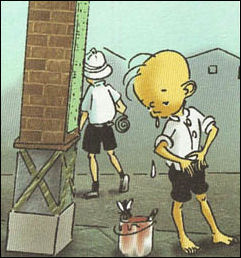
Sanmao, irreverent Chinese humor In the spring of 2011 happiness suddenlly became a hot topic among Chinese politicians. "Everything we do is aimed at letting people live more happily and with more dignity," Premier Wen Jiabao declared in his New Year's address. During the National People's Congress and Chinese People's Political Consultative Conference in March, it came up so often that the official New China News Agency proclaimed, "No doubt, 'happiness' is the keyword for the two sessions." "It even sounds a little weird in Chinese to ask, 'Are you happy?' but now there is so much talk about happiness, it's almost become a cliche," Christopher K. Hsee, a Chinese-born University of Chicago professor who is credited with bringing happiness studies to China, told the New Yorker. David Pilling wrote in the Financial Times, For many middle-class city dwellers...today’s China is a fantastic adventure, a lunge into a world of previously unimagined possibilities. Even among the generation that lived through the horrors of the Cultural Revolution, this is widely regarded as the most optimistic time to be alive in China in hundreds of years. [Source: David Pilling, Financial Times, June 10, 2011]
Evan Osnos wrote in The New Yorker in April 2011: “Everywhere you turn in Beijing these days, the city is reminding us to be happy. “Laborers’ Happiness To Be Broadcast Around Capital,” was the headline on a piece in the Global Times... explaining that the Beijing Trade Union has arranged for forty thousand screens on buses and subway trains, as well as jumbotrons in city train stations and shopping malls, to play “happy testimonials” from workers, farmers, and teachers. A crew called the “Happy Blossom” is also making short films about the happy lives led by factory workers, to be shown on Beijing television. [Source: Evan Osnos, The New Yorker blog, April 22, 2011]
“It was in that spirit that China Central Television called me... to ask if I would be on a talk show to discuss the subject of happiness. I obliged. ...In the event, the questions were apt enough: “How happy are the Chinese?” and “Can the Chinese afford to talk about happiness, not G.D.P.”“ I was delighted to see the most vexing query tossed past me to my co-panelist, a pleasant, if nervous, Chinese scholar: “A philosophical question: What is happiness?”
“All this happy talk began last month when Premier Wen Jiabao opened the annual meeting of the legislature with the declaration that the government exists to “let people live more happily and with more dignity.” The government has since announced plans to adopt a “happiness of the people” index to measure the performance of officials, replacing the sacred yardstick economic growth. Guangdong province has vowed to become “happy Guangdong,” Beijing set out to make sure its citizens lead “happy and glorious lives,” and the city of Chongqing said it would make its people the happiest in the country.” A few years before Wen quoted a famous Chinese poem by Ai Qing, the father of Ai Weiwei: “If you ask me what happiness means, I tell you to ask a meadow in bloom, or a river that’s no longer frozen.” Happiness, as a Chinese political objective, did not fare well under Marx. But it has a history going back to Confucian thinkers, who felt that “a key task for rulers is to strive to improve a peoples’ happiness, which is itself grounded in a moral way of life,” Yan Xuetong, the Tsinghua scholar whose new book, edited by Daniel Bell, is “Ancient Chinese Thought, Modern Chinese Power,” wrote recently. “Because poverty was an obstacle to moral behavior, they believed that the state should be vitally concerned with eliminating it. The idea that the state should pursue economic growth without consideration for moral concerns was anathema to Confucius and his followers.”
In its article on happiness Global Times recognized not everyone in China is happy. “Not every laborer appears to lead a happy life,” the articled read. “I am not happy at all to be a teacher. I majored in bel canto and I have to teach pupils because I don’t have better job opportunities,” a 25-year old music teacher told the paper.
China's Happiness Campaign
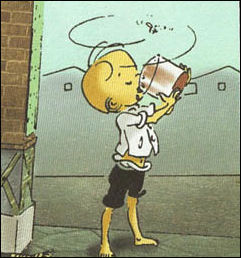
Sanmao, irreverent Chinese humor Under Premier Wen Jiabao’s call to make prosperity more "balanced" a torrent of happiness campaigns, happiness surveys and happiness-promotion measures were launched. Keith B. Richburg wrote in the Washington Post, “In Beijing, for the May Day holiday, 17 giant screens across the city and thousands of small televisions on buses and subways and in office buildings showed "happy testimonials" from workers. Beijing Television ran a series of short films called "Happy Blossoms," documenting the apparently contented lives of teachers, factory workers and others.” [Source: By Keith B. Richburg, Washington Post, May 17, 2011]
Other provinces joined the happiness caravan. Wang Yang, the party secretary of Guangdong province, promoted the idea of "happy Guangdong" as part of his government's five-year plan. "Happiness for the people is like flowers," Wang wrote in an article. "The party and the government shall create the proper environment for the flowers to grow." Guangdong released the results of a happiness survey in which 500 residents ages 17 to 35 were interviewed. More than 90 percent scored 60 out of 100 on a happiness scale, with 100 being bliss and 1 being outright misery. Not to be outdone, Chongqing city announced a bold plan to become "the central city of the country where people have the strongest feelings of happiness."
Barbara Demick wrote in the Los Angeles Times, “At the local level, municipal governments are drawing up happiness indexes and competing with one another for the title of "China's happiest city." The Beijing municipality announced last month that colleges would soon be adding courses in how to handle pressure, relations and mental health. The courses will be optional at first, but could become mandatory. [Source: Barbara Demick, Los Angeles Times, May 16, 2011]
Although happiness is not yet on the bestseller list in China ("Self-help books in China only look at how to get rich," Zhang said), interest is growing. Online lectures by the happiness guru Tal Ben-Shahar are also popular. Kevin Liu, a 32-year-old psychology graduate who runs a consulting firm, says there are a number of start-up companies training people in the art of happiness. "This kind of service has just emerged in China in the past five years," said Liu, whose company works with corporate employees. "We think through training you can raise your ability to be happy."
Why is the Chinese government suddenly jumping on the happiness bandwagon? Cynics might argue that officials are looking for an alternate measure of success for that inevitable point when economic growth plateaus. But Hsee believes the concept of happiness is a natural corollary of the Communist Party's propaganda about creating a "harmonious society." "Happiness is a subject that is consistent with harmony," Hsee said.
Political Side of China's Happiness Campaign
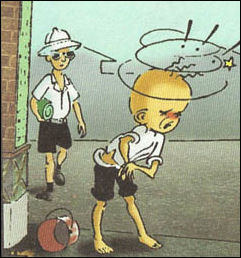
Sanmao Keith B. Richburg wrote in the Washington Post, “There was a serious purpose behind the new approach, which includes lowering economic growth targets to a more modest 7 percent. Chinese officials worry that years of "GDP obsession," as one of them put it, could contribute to a public backlash against rising prices, unemployment and other economic woes.” [Source: By Keith B. Richburg, Washington Post, May 17, 2011]
“The central government has embarked on a series of measures aimed at improving people's livelihoods. Measures were announced to try to rein in the spiraling cost of real estate, including building more low-income housing. People with lower incomes were given a tax break, and the government announced a price rollback on 162 types of common medications. Also, taking direct aim at one of the largest sources of discontent across the country, the government announced restrictions on forced demolitions of homes by private developers.
"The policy orientation has changed from enriching the country as the first priority to enriching the people as the first priority," said Wang Yukai, a professor at the Chinese Academy of Governance, the ruling State Council's training school for mid-level bureaucrats. "People's happiness and livelihood are now given more weight in the government's decision-making process."
The happiness campaign coincides with a widespread crackdown on internal dissent, including the arrest of scores of lawyers, bloggers and activists, among them the internationally renowned artist Ai Weiwei. Restrictions on foreign journalists, academics and foreign embassies also have been increased. Zhang Ming, a political science professor at Beijing's Renmin University, said the actions reflect alarm at the turmoil unfolding across the Middle East and North Africa, including the toppling of authoritarian leaders in Egypt and Tunisia. "On one hand, the government control is more strict, in all aspects of the society, such as on the Internet, and they try to maintain the stability by force," Zhang said. "On the other hand, the government tries to ease social tension by implementing more favorable welfare policies."
Happiness Surveys in China

Sanmao A survey conducted in 2010 found that life satisfaction levels were on the decline among both urban and rural Chinese, according to the Chinese Academy of Social Sciences, a government-affiliated research organization that published the findings. The poll found a huge gap between recognition of the country’s economic achievements and people’s well-being on an individual level. Topping the list of concerns were prices, the health-care system, high property costs and employment. But a separate report published in May 2011 by the organization, based on a survey of 4,800 people, found that more than 74 percent were either happy or very happy. [Source: By Keith B. Richburg, Washington Post, May 17, 2011]
Barbara Demick wrote in the Los Angeles Times, “Nearly a dozen different polls, some commissioned by government agencies, have recently tried to gauge the happiness of the Chinese people. The answers aren't always what the leadership is looking for. The happiness surveys show great disparities in China. Among the findings: Northerners are happier than southerners. Urban residents are happier than rural ones, but not by as large a margin as people would expect given that getting off the farm is a badge of success in China.
Within the occupations, civil servants are happiest, enjoying the security of a steady paycheck rather than the stress of entrepreneurship. Second as far as happiness are real estate brokers. Men are happiest at the age of 41. Women are happiest at 28. The most unhappy group of people are women ages 40 through 44.
Interpretations of the Happiness Surveys
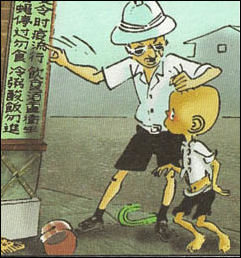
Sanmao Barbara Demick wrote in the Los Angeles Times, “Many countries, including Britain and France, are considering "happiness indexes" as a supplement to more traditional measures of success, but there is perhaps greater urgency in China because of the vertigo-inducing nature of change. And for scholars of what makes people happy — "hedonomics," as it's known in academia — China is the perfect laboratory for studying some of the most vexing questions in the field. [Source: Barbara Demick, Los Angeles Times, May 16, 2011]
Are people happier when everybody is equally poor (more or less the scenario in China for much of the late 20th century) — When people get richer, but some much more so than others, do the income disparities create unhappiness — The research now underway in China builds on what is called the Easterlin Paradox, named for the economist who in the 1970s wrote that once people get enough money to meet their basic needs, higher incomes don't necessarily lead to more happiness.
Much of the academic research is being done in Shanghai at Jiaotong University's Antai College of Economics and Management. Using surveys, experiments involving volunteers and computer simulations, researchers there are studying the effect of rapid economic and social change on happiness levels. Swift change, even positive change, can breed discontent. "People respond dramatically to change, good or bad. In our studies of happiness, we find that people can't get used to the new situation," said Wang Fanghua, a professor who is leading the research.
Another phenomenon that is potentially worrisome for the Chinese: When people get richer, they quickly adjust to the new reality, taking for granted what is behind them and looking with envy at those who are ahead. "What is clear is that satisfaction with money is relative. If somebody got a higher salary this year than last, he might not be happy," Wang said. "But if his income is better than his friends', then he will be happy."
The rub for the Chinese is also that aspirations often outpace reality. "In a time of rising expectations, people are often unhappy because they have higher expectations about what they need. It is obvious from the surveys that social development is lagging behind the economy," said Zhang Hui, who is in charge of the happiness studies at Beijing-based Horizon Research Consultancy Group, one of China's leading pollsters. Separate polls conducted by the agency show a steady slide in both happiness and quality of life since 2005.
Academic Look at Chinese Happiness
“Chinese Discourse on Happiness” edited by Gerda Wielander and Derek Hird (Hong Kong University Press, 2018) analyzes how different social groups make use of the concept of happiness and shows how closely official discourses on happiness are intertwined with popular sentiments. The Chinese Communist Party’s attempts to define happiness and well-being around family-focused Han Chinese cultural traditions clearly strike a chord with the wider population. The collection highlights the links connecting the ideologies promoted by the government and the way they inform, and are in turn informed by, various deliberations and feelings circulating in the society.
“Contributors analyze the government’s “happiness maximization strategies,” including public service advertising campaigns, Confucian and Daoist-inflected discourses adapted for the self-help market, and the promotion of positive psychology as well as “happy housewives.” They also discuss forces countering the hegemonic discourse: different forms of happiness in the LGBTQ community, teachings of Tibetan Buddhism that subvert the material culture propagated by the government, and the cynical messages in online novels that expose the fictitious nature of propaganda. Collectively, the authors bring out contemporary Chinese voices engaging with different philosophies, practices, and idealistic imaginings on what it means to be happy.
The essays: Introduction: Chinese Happiness — A Shared Discursive Terrain by Gerda Wielander; Happiness In Chinese Socialist Discourse — Ah Q And The “Visible Hand” by Gerda Wielander; Tibet And Happiness In Chinese Media Discourses — Issues And Contestation by Jigme Yeshe Lama; Happiness “with a Chinese Taste”: an Interpretive Analysis of CCTV 2014 Spring Festival Gala's Public Service Announcement (PSA) “Chopsticks” (Kuaizi by Giovanna Puppin; “As Long As My Daughter Is Happy”: “Familial Happiness” In Parental Support-Narratives For LGBTQ Children by Elisabeth Engebretsen; Smile Yourself Happy: Zheng Nengliang And The Discursive Construction Of Happy Subjects by Derek Hird; “Happy Housewives”: Gender, Class, and Psychological Self-Help in China by Jie Yang; Cultivating Capacity for Happiness as a Confucian Project in Contemporary China: Texts, Embodiment, and Moral Affect by Yanhua Zhang; Talking of Happiness: How Hope Configures Queer Experience in China by William F. Schroeder; Chinese Happiness: A Proverbial Approach Of Popular Philosophies Of Life by Mieke Matthyssen; The Happiness of Unrealizable Dreams: On the Pursuit of Pleasure in Contemporary Chinese Popular Fiction by Heather Inwood.
Unhappy People in China

Demon and victim
in a Taoist Temple Not everyone seems to be feeling happier. In advance of the National People's Congress, a state-owned information portal, China.com.cn, polled 1,350 people and discovered that only 6 percent listed themselves as "very happy," as opposed to 48 percent who were distinctly "not happy." (The rest were "so-so" or "unsure.") A news story reporting the unhappy results in the English-language China Daily was promptly zapped from the Internet. [Source: Barbara Demick, Los Angeles Times, May 16, 2011]
The results of another poll must have been even more alarming to the powers that be. Gallup last month ranked China 92nd out of 124 countries in a poll in which people assessed their own "well-being." Only 12 percent of Chinese described themselves as "thriving." That put China roughly on par with Egypt, Libya, Yemen and Bahrain, countries where the discontent bubbled up in the form of popular uprisings. Denmark led the pack with 72 percent of people reporting that they were thriving, while the United States came in at No. 12, with 59 percent. Rising commodity and real estate prices were major causes of dissatisfaction. Many of those surveyed blamed corruption and an unfair social system for their hardships.”The pressure of living is too much for me,” Sun Wenguang, a 27-year-old real estate agent in Beijing told the Washington Post . “I sell and rent houses to people all day, but I can’t afford even the smallest apartment.” Wang Luxia, a 57-year-old retired worker, said her main worry is that the increases in pension payments never seem to be enough, especially as the price of groceries continues to increase. “I feel I am poorer in the society than before,” Wang said. “I know that the government made efforts to improve people’s livelihood. But it’s still not enough.” [Source: By Keith B. Richburg, Washington Post, May 17, 2011]
Stephen Caraher of China Geeks wrote, “Everything I see, from the internet to my daily interactions with regular people, is telling me that things are getting worse and people are not happy. The atmosphere is very different from the way it was even a year ago. Some of that may just be me, but not all of it; even the apolitical Chinese people I know seem to be feeling it. All you have to do is log on to Weibo, search for “inflation”, “demolition”, or the name of whatever food has been discovered most recently to be poison. People, lots of people, are very angry. [Source: Stephen Caraher, China Geeks, May 29, 2011]
The government, for its part, remains steadfastly dedicated to the idea that everything can be fixed if they can just continue developing the economy. I have no doubt that China will continue to develop, but if the current situation continues, development could actually be worse than if the economy were to recess. Now, people are left to wonder why the GDP is climbing by 9 percent and prices are doubling but their salaries are staying the same. Mix that question with a hearty dose of tales of corruption fed via Weibo, and it’s no wonder that Weibo users — lots of them — are calling for executions of government officials every time a new food product turns out to be unsafe. ..It seems like pretty much everything is worse, and to be perfectly honest, it’s fucking depressing."
Mental Health in China
Share of population with mental health and substance use disorders, 2017: 11.4 percent Mental and substance use disorders as a share of total disease burden, 2017: 5.96 percent Share of the population with depression by average country income, 2017: 3.31 percent Prevalence of depression:males: 2.57 percent; females: 4.04 percent. 2017 World Bank Mental Health article: ourworldindata.org ]
Share of population with anxiety disorders, 2017: 3 percent Prevalence of anxiety disorders: males: 2.29 percent; females: 3.78 percent, 2017 Share of population with an eating disorder, 2017: 0.16 percent Prevalence of eating disorders: in males: 0.11 percent; females: 0.22 percent, 2017 Deaths from eating disorders: 40 deaths out 1.35 billion people in 2017
Share of population with schizophrenia, 2017: 0.34 percent Prevalence of schizophrenia: in males: 0.33 percent; females: 0.34 percent, 2017 Suicide death rate:7.21 per 100,000 people
Psychological Problems in China

Demon in a Taoist Temple When asked what problems he sees most often among his patients, Zhong Jie, psychoanalytic an assistant psychology professor at Peking University, told The New Yorker, "If a grandfather, for example, was criticized and abused in the social upheaval of the nineteen-sixties and seventies, then he couldn't take care of his child, so the child was raised in a chaotic situation and had to develop defensive ways to cope." In that way, the Cultural Revolution can produce marital or family problems that trickle down to a third generation. "From my point of view, the upheaval never ended," he said. "It repeats within the family."[Source: Evan Osnos, The New Yorker, January 10, 2011]
Zhang also treats patients who during childhood were separated from their parents, because of the demands of their parents' work. "This can create a lot of trauma for a child," he said. After a moment, he added, "My experience was like this." His parents, who were laborers in Sichuan Province, sent him, at age four, to be raised by grandparents. "This led to a very complicated life," he said, with a slight smile. He recently divorced. "It's sad, but it's the reality." He was spending a lot of time with his own analyst: four hundred and eighteen sessions and counting. "I told my analyst that maybe the separation explains why I work very hard on my work, and why I keep a distance in interpersonal relationships." He laughed awkwardly. "It's easy to understand, but it's a little bit hard to change. That's why I need more sessions."
Elise Snyder, an associate clinical professor of psychiatry at Yale who provides analysis to Chinese patients over the Web via Skype told The New Yorker she heard the story of a man in his early twenties in a gritty, industrial city who is saving up for sex-change surgery; in the meantime, his father has suggested a local therapy that involves learning to box in order to become more masculine. A few days later, Snyder received a briefing on an elite graduate student who was paralyzed with the fear of failing the English exam that is required for study abroad. In some instances, younger students spoke candidly with her about their lives. In a classroom at one university, a well-dressed undergraduate raised her hand and said, "Sometimes I go a whole month where I hardly eat any food. I drink only liquids, and I have trouble sleeping."
Psychological Problems and the Mao Era
Evan Osnos wrote in The New Yorker: “To capture contemporary China's specific combination of stresses, the analyst Huo Datong separates problems into two categories: “jiating xiaoshi”, or household issues — the private dynamics of couples and families — and “guojia dashi” , national issues, the things, as Huo puts it, that “are handled by the ruling Party on a national level and which people are never supposed to express doubts about: politics, freedom of speech, the right to demonstrate, and religion.” owever, the more time I spent among China's new therapists and patients, the more these two realms seemed to be indistinguishable.” [Source: Evan Osnos, The New Yorker, January 10, 2011]
Zhang Jingyan, a retired art-history professor in Chengdu who was 12 when the Cultural Revolution broke out told The New Yorker,"I went to watch, and it was terrifying. I watched people being thrown off buildings," she said. "I couldn't move or run away. I was completely frozen by it. And then I felt ashamed: Why don't I have more class consciousness? These are the enemies of our class! How come other people are capable of hitting them, and I'm not?"
“Zhang's father was a senior Party scholar at Sichuan University, and his stature made him a target for persecution.” Esnos wrote. “He was beaten, humiliated, and assigned to hard labor; he had cirrhosis, but his political status made it impossible for him to get decent care, and he died at forty. Zhang built an academic career and a family, but, over time, she became haunted by a sense of loss.” "What do I want in this society? Where do I fit in? Where is my place?” she asked, “These are the things that have always bothered me. It didn't affect my work, but, spiritually, I always felt that I was lacking something."
Zhang has come to see a symmetry in China's lurch from political mania to capitalism at all costs. "We had a mission—to liberate the world!—and then, all of a sudden, that bubble burst, and none of it was true. So what were we to do now? That's when we started making money, and now we cling to our money. But it can't bring us spiritual satisfaction." As Zhang sees it, that's the modern Chinese predicament. For all that separates her experience from that of a factory worker on an assembly line in Shenzhen, she empathizes with the factory worker. "We all need to know the value of our own existence," she said. "If they don't see the value of their existence, then they won't see the meaning of living."
“Psychoanalysis may give the Chinese a vocabulary for discussing the effects of the Cultural Revolution, or the true costs of a frantic sprint to prosperity, or the toll of life under authoritarianism,” Osnos wrote, “but I find it hard to picture the latest Freud Fever lasting long here. Three or four years on the couch is an eternity in China, and an absurd mismatch for the life of an iPhone assembly-line worker. China is more likely to absorb the most practical of Freud's ideas and discard the rest, as it has with Marxism, capitalism, and other imports. With luck, it might leave behind more than a few people inclined to demand respect for the value and idiosyncrasy of individual minds.”
Image Sources: Asia Obscura;
Text Sources: New York Times, Washington Post, Los Angeles Times, Times of London, National Geographic, The New Yorker, Time, Newsweek, Reuters, AP, Lonely Planet Guides, Compton’s Encyclopedia and various books and other publications.
Last updated September 2021
